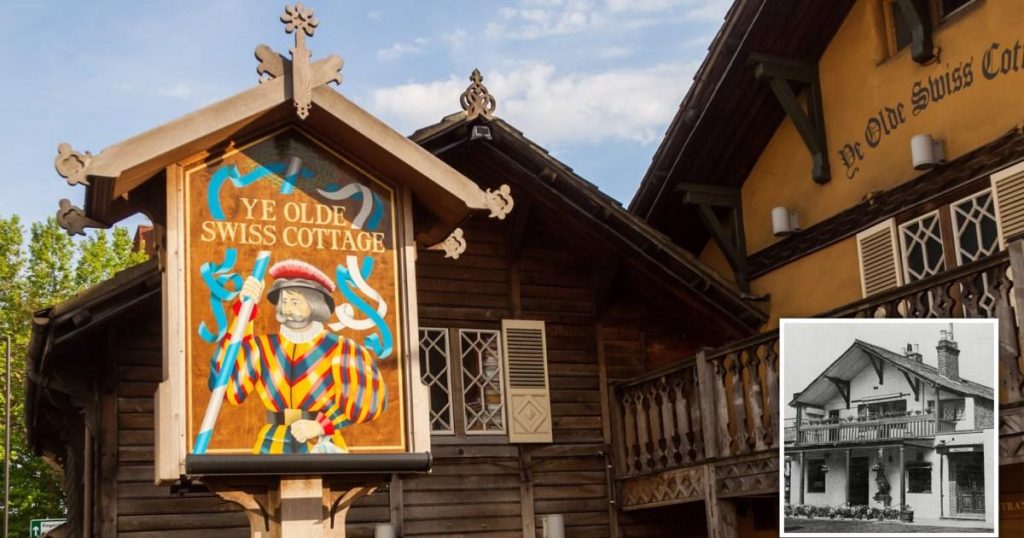The unexpected closure of Ye Olde Swiss Cottage, a beloved North London pub, has left staff and patrons devastated. A fixture on the Finchley Road roundabout since 1830, the distinctively designed pub, styled as a Swiss chalet, lent its name to the nearby Swiss Cottage tube station, opened in 1868. The pub’s final pints were poured on a Saturday night, marking the end of an era for a local institution. The building is currently being stripped of its interior, and the remaining beer has been returned to Sam Smith’s Brewery, which sold the property. The new owner and the future of the site remain shrouded in mystery, leaving locals and the Campaign for Real Ale (CAMRA) anxious about its fate and advocating for its continued existence as a pub.
Paul Shoebridge, a barman who has worked at the pub for 16 years and resided in its basement, expressed his sadness over the closure. He recalled serving a diverse clientele, from footballer Dion Dublin and the cast of Eastenders to local residents and prominent figures like actor Sean Bean, a regular in the pub’s pool room. Bean, currently starring in the crime drama “This City is Ours,” was a known fixture at the pub, drawn to its unique atmosphere and camaraderie. Shoebridge, while preparing for his retirement, has been asked to remain on-site for a few weeks to oversee the handover to the new owner, the identity of whom remains undisclosed. He voiced his hope that the building would not be demolished and replaced by flats, a common concern in a city grappling with development pressures.
The pub’s unique architecture has always stood out amidst the surrounding brutalist buildings and modern flats. Its location, beside an Odeon cinema and opposite the Hampstead Theatre and the Central School of Speech and Drama, made it a popular gathering place for those involved in the arts, as well as journalists from the local Hampstead and Highgate Express newspaper, whose offices were nearby in the early 2000s. Known for its affordable Sam Smith’s beers, particularly the Alpine lager, the pub offered a traditional London pub experience within its unusual Swiss chalet setting. Regulars like Kevin Edwards, a local resident, lament the loss of the pub’s unique atmosphere and express concern about potential redevelopment of the site.
The history of the pub’s distinctive design remains somewhat unclear, though its location next to a former toll gate suggests it served travelers passing through. Its quirky aesthetic made it a local landmark, a curious anomaly in an area increasingly dominated by modern architecture. The pub’s closure underscores a broader trend of pub closures in London, with forty-six pubs closing in the six months leading up to June of the previous year, according to real estate analysts Altus. This trend raises concerns about the preservation of community spaces and the changing landscape of the city.
CAMRA has emphasized the significance of the pub’s closure as a loss not just for the local community but for London as a whole. With a history spanning two centuries and a relative scarcity of pubs in the area, CAMRA stresses the importance of retaining the site as a public house. Their concern echoes the sentiments of locals who value the pub as a social hub and a piece of local history. The pub’s closure highlights the challenges faced by traditional pubs in an evolving urban environment, where rising property values and changing social habits often contribute to their decline.
The future of Ye Olde Swiss Cottage remains uncertain. While the brewery has confirmed the sale of the property, the new owner’s plans have not been revealed. This lack of transparency fuels speculation about the building’s fate, leaving locals in limbo. The closure of this historic pub marks the end of a chapter for a community that cherished its unique character and the sense of connection it fostered. The ongoing concern about the site’s future reflects a wider anxiety about the preservation of historical landmarks and community spaces in a rapidly changing urban landscape. The story of Ye Olde Swiss Cottage serves as a microcosm of the broader challenges faced by traditional pubs in a modern city.











